Privacy Harms, Global Privacy Regulation, and Algorithmic Decision Making are Major Topics During Privacy Papers for Policymakers Event
For the 12th year, the Future of Privacy Forum (FPF) hosted its Privacy Papers for Policymakers event, honoring the 2021 Privacy Papers for Policymakers Award winners. This year’s event featured an opening keynote by Colorado Attorney General Phil Weiser and facilitated discussions between the winning authors – Daniel Solove, Ben Green, Woody Hartzog, Neil Richards, Joris van Hoboken, Ronan Ó Fathaigh, Jie Wang, Shikun Zhang, and Norman Sadeh – and leaders from the academic, industry, and policy landscape, including Maneesha Mithal, Sarah Holland, Travis Hall, Quentin Palfrey, Dr. Clarisse Girot, and John Howard, Ph.D.
In his keynote, AG Weiser outlined his approach for fostering conversations in the privacy space that bring together policymakers and academics while ensuring the integrity of the discussions, an approach Weiser called the “true north” of his career. Weiser spoke to the lack of dialogue within Congress and offered examples of how his home state of Colorado has facilitated productive conversations at the state level around data privacy. Weiser pointed to the recently passed Colorado Privacy Act as a testament to how bipartisanship is “still alive and well at the state level.”
AG Weiser stated that states considering privacy legislation must bring together “those who are practicing on the ground as well as those who are very gifted scholars.” With so many entities in the field, it is challenging to utilize a one size fits all solution or approach. Weiser noted, “we want to create a regulatory regime that is adaptable, and that can both protect data and consumers’ privacy while not getting in the way of innovation.” Through respectful and thoughtful collaboration, advances in data protection, security, and privacy can be achieved at the state and federal levels.
Weiser stressed the importance of collaboration and respect in conversations around privacy. He highlighted the Ginsburg/Scalia Initiative, a bi-partisan gathering of state AGs honoring the friendship of the two late Supreme Court Justices, which convenes to engage in dialogue to solve pressing issues. Weiser concluded his keynote by congratulating FPF on creating an event that followed in the spirit of Justices Scalia and Ginsburg. FPF’s PPPM event encourages all attendees to “think differently, to take different sorts of thoughts seriously, and to look at issues from different angles.”
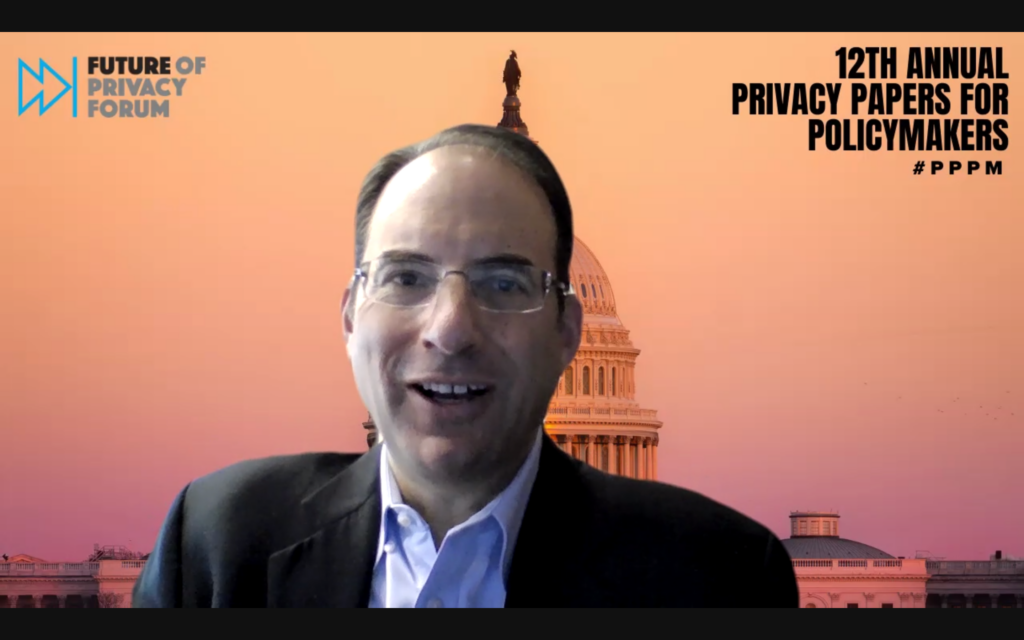
Following Attorney General Weiser’s keynote address, the event shifted to moderated discussions between the authors and leaders from the academic, industry, and policy communities. Click the links below to read each of the winning papers, or read the 2021 PPPM Digest, which includes summaries of the papers and more information about the authors and judges.
Daniel Solove kicked off the discussion section of the event by talking about his paper, Privacy Harms, with Maneesha Mithal, Cybersecurity Partner at Wilson Sonsini. This paper, co-authored by UVA School of Law Professor Danielle Citron, analyzed how courts define harm in cases involving privacy violations and how the requirement of proof of harm has impeded the enforcement of privacy law due to the dispersed and minor effects that most privacy violations have on individuals. “We think that harm should only be required when the goal is compensating people,” said Daniel Solove. “When the goal is deterrence, really the harm shouldn’t matter. The goal should be what’s the most effective deterrence.”
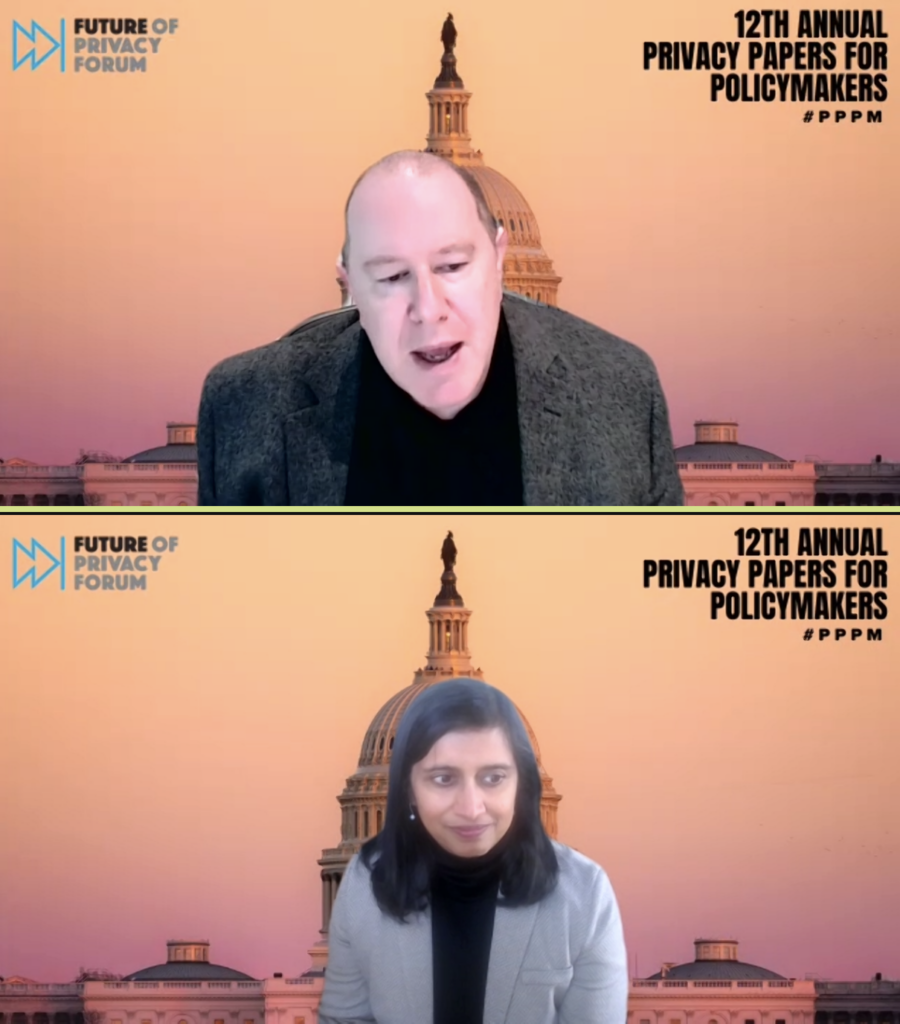
Next, Woody Hartzog, Northeastern University School of Law and Khoury College of Computer Sciences, Stanford Law School Center for Internet and Society; and Neil M. Richards, Washington University School of Law, Yale Information Society Project, Stanford Center for Internet and Society discussed their paper, The Surprising Virtues of Data Loyalty. The authors were joined by Sarah Holland, Public Policy Manager at Google. Professors Hartzog and Richards’ paper looked into criticisms of data loyalty, arguing that the concept of data loyalty has some surprising virtues, including checking power and limiting systemic abuse by data collectors. “We think that data loyalty actually gets you something that existing law does not. We think it’s able to cover a lot of new problems,” said Woody Hartzog. “We think that data loyalty is a way to firm up existing obligations.”
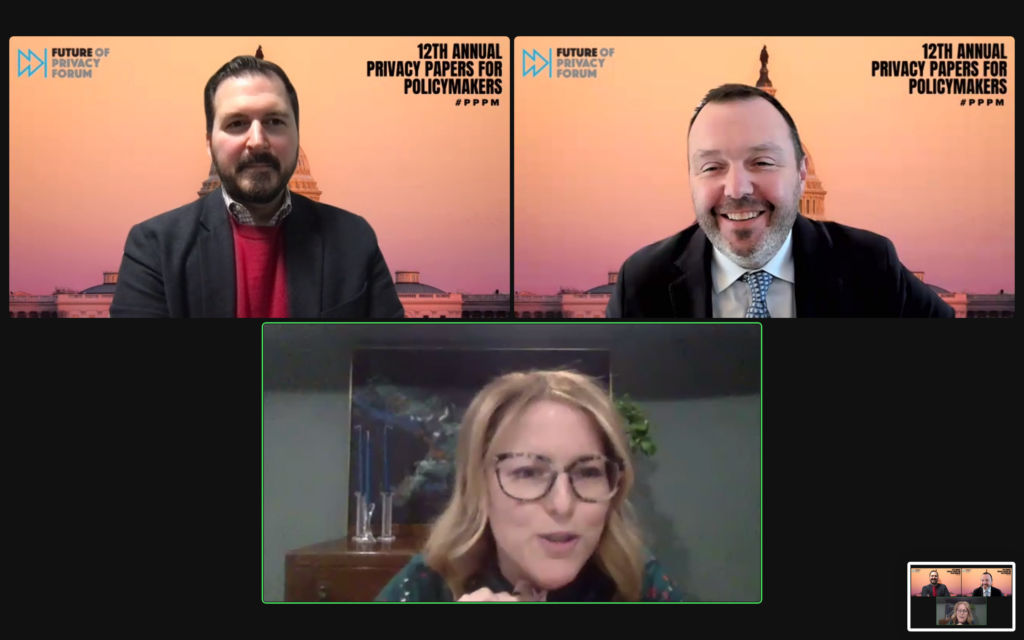
Next, Ben Green, the University of Michigan at Ann Arbor, Gerald Ford School of Public Policy, Harvard University, Berkman Klein Center for Internet & Society, discussed his paper, The Flaws of Policies Requiring Human Oversight of Government Algorithms, with Travis Hall, Telecommunications Policy Analyst at the National Telecommunications and Information Administration (NTIA). His paper analyzed the use of human oversight of government algorithmic decisions and concluded that humans could not perform many of the desired oversight responsibilities. He argued that by continuing to use human oversight as a check on these algorithms, the government legitimizes the use of faulty algorithms without addressing the associated issues. “The vast majority of evidence shows that people are incapable of reliably performing exactly the roles that these policies are calling for. The problem is the regulation doesn’t actually address the underlying harm,” said Ben Green. “I think that gets us into this really gnarly situation where we have a false sense of security, that these algorithms are appropriate and legitimate to use, when in fact, the underlying concerns haven’t actually been resolved.”
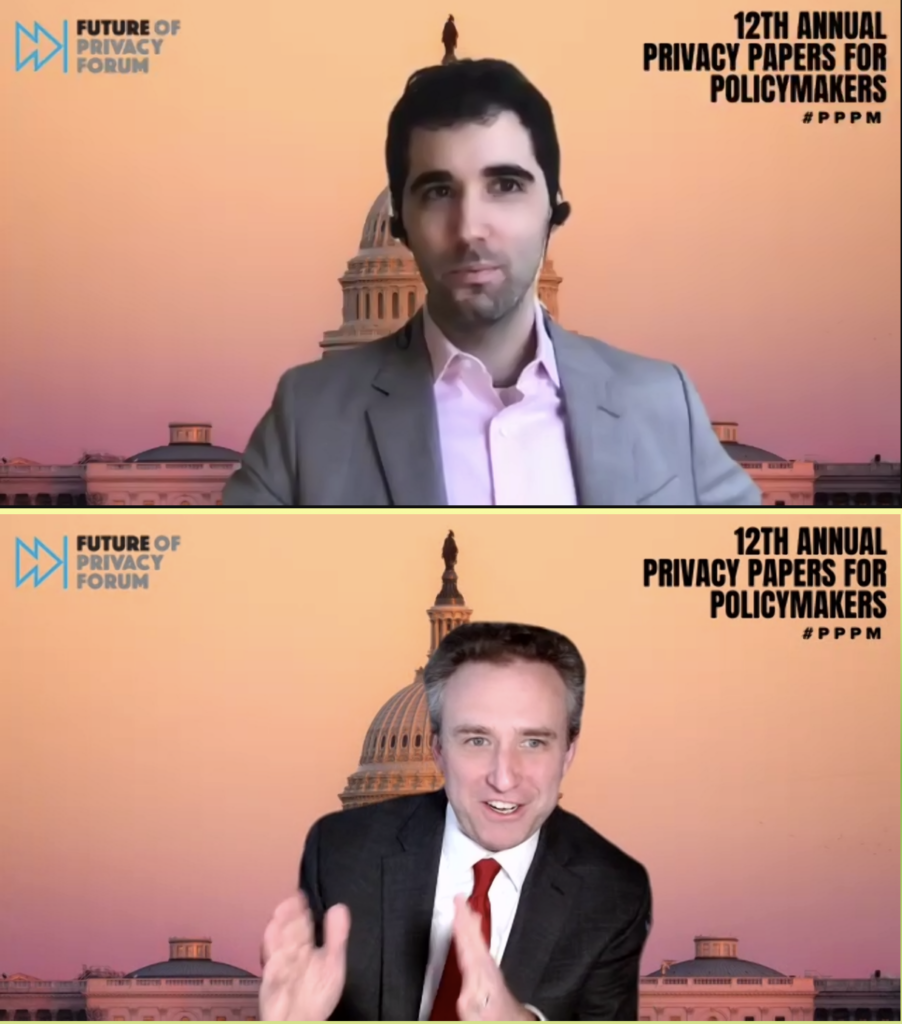
The next paper discussed was Smartphone Platforms as Privacy Regulators by Joris van Hoboken, Vrije Universiteit Brussels, Institute for Information Law, University of Amsterdam; and Ronan Ó Fathaigh, Institute for Information Law, University of Amsterdam. The authors were joined by Quentin Palfrey, President of the International Digital Accountability Council. The paper analyzed the role of online platforms and their impact on data privacy in today’s digital economy before providing an argument as to what platforms’ role should be in legal frameworks. “What we try to do is to build a disclosure model around the regulatory behavior that these [smartphone] platforms are engaging in,” said Ronan Ó Fathaigh. “We don’t make the claim that platforms are engaging in behavior that is anti-competitive, but there are a lot of different commentators that are making those allegations, and certain app companies are making allegations that privacy is being used as a tool in anti-competitive behavior. We give the platforms the benefit of the doubt.”
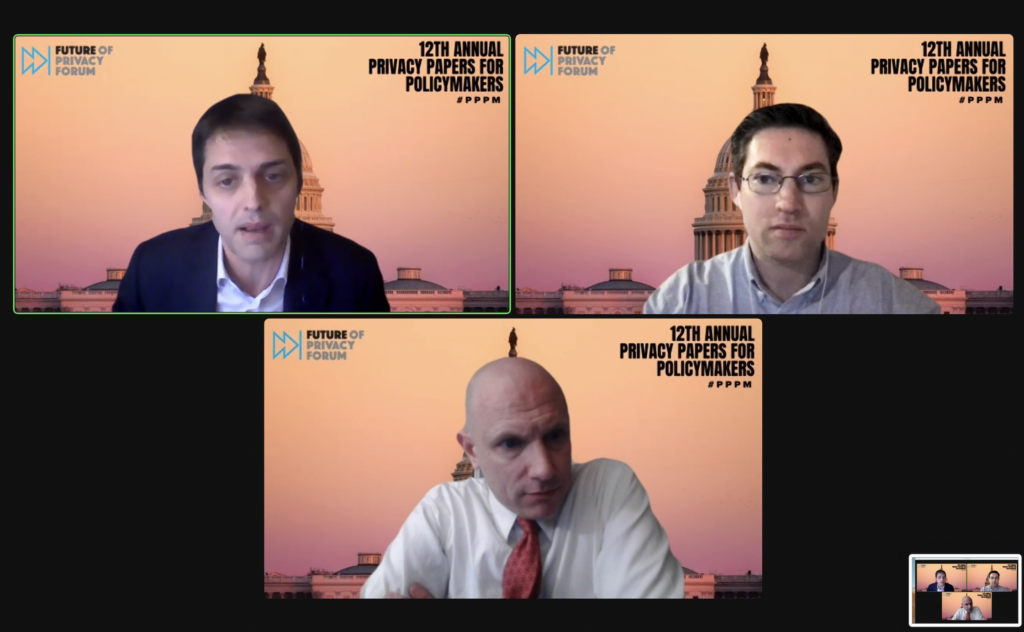
Jie (Jackie) Wang, W&W International Legal Team, Kinding Partners, spoke next on her paper, Comparison of Various Compliance Points of Data Protection Laws in Ten Countries/Regions, with Dr. Clarisse Girot, Managing Director for Asia Pacific at the Future of Privacy Forum. Her paper compares China’s Personal Information Protection Law (PIPL) with data protection laws in nine regions to assist overseas Internet companies and personnel to better understand the similarities and differences in data protection and compliance between each country and region. “Helping ensure personal data compliance is part of my daily work, ” said Wang. “The best way to learn the PIPL is to digest it by writing an in-depth analysis of it.”
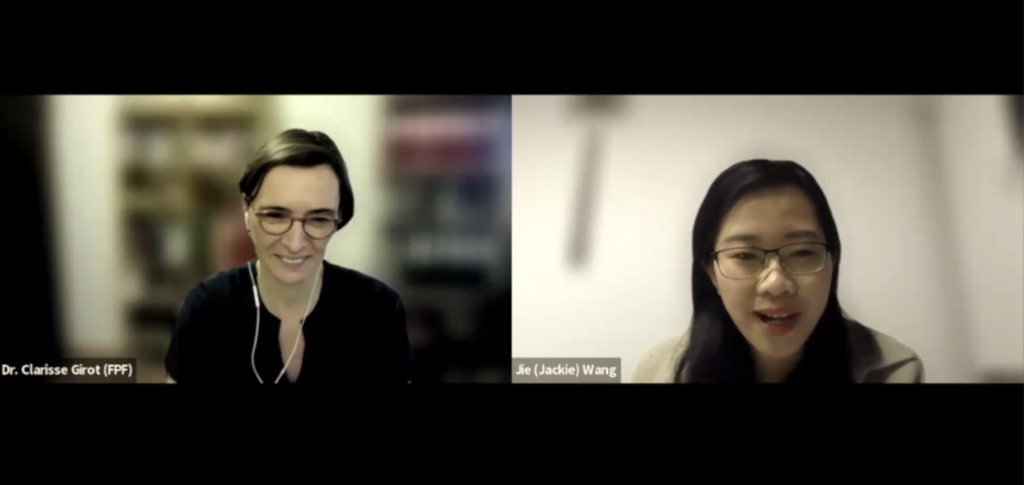
Shikun (Aerin) Zhang and Norman Sadeh, Carnegie Mellon University, closed the event discussing their paper, co-authored by Yuanyuan Feng, University of Vermont; Lujo Bauer, Carnegie Mellon University; Lorrie Faith Cranor, Carnegie Mellon University; and Anupam Das, North Carolina State University, “Did you know this camera tracks your mood?”: Understanding Privacy Expectations and Preferences in the Age of Video Analytics. Shikun Zhang and Norman Sadeh were joined by Dr. John J. Howard, Principal Data Scientist at Maryland Test Facility. The paper seeks to determine how individuals should be notified that they are being recorded by studying 123 individuals’ sentiments across 2,328 video analytics deployments scenarios. “People often don’t realize that many of these cameras are connected to video analytic capabilities,” said Professor Sadeh. “We believe that there’s really a need to better understand how people feel about these very diverse scenarios as they’re emerging today, and using that to inform the design idea as mechanisms to notify people and to give them, ideally, the ability to exercise those rights that, in principle, are now being made available to them.”
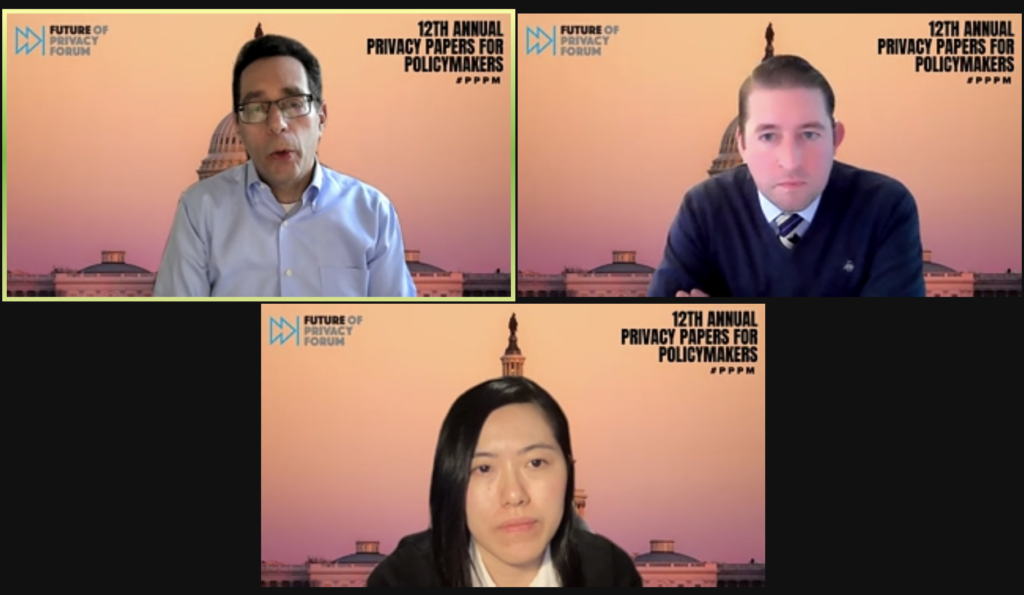
Thank you to Attorney General Weiser and Honorary Co-Hosts Senator Edward Markey and Congresswoman Diana DeGette for their support and work around this event. We would also like to thank our winning authors, discussants, everyone who submitted papers, and event attendees for their thought-provoking work and support. Learn more about the event on the FPF website and watch a recording of the event on the FPF YouTube channel.
